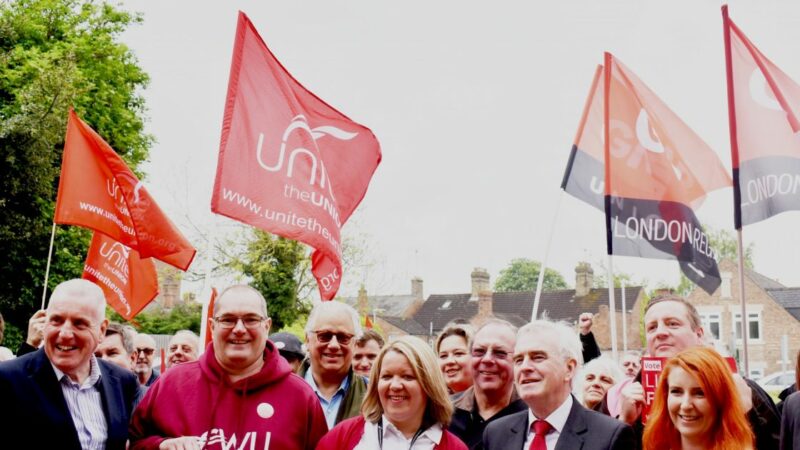
Checking their inboxes earlier this week, Labour members might have been surprised to find an email from deputy leader Angela Rayner urging them to join a trade union. High-level Labour politicians should have been encouraging this way before now but, amid the economic uncertainty of the coronavirus, the unions are an indispensable bulwark for workers who would otherwise be at the mercy of exploitative employers and Conservative economic policy.
As much as the deputy leader’s appeal is welcome, an email to members is simply not enough. Despite its half-a-million strong membership, the Labour Party is trivially insignificant compared to the millions of wage workers who are both the backbone of the economy and the ones whose health and livelihoods are most at risk during this pandemic. Now more than ever, Labour has a responsibility to urge every single worker in Britain to join a trade union.
In recent decades, the dominant narrative surrounding the unions has been one of decline. In 1979, more than half the British workforce were union members – today that figure is just 23.4%. And as union density has declined, so too has the union wage premium. In 1995, the 32.4% of UK workers who were union members enjoyed a wage premium of 25.9%. That premium has fallen to just 7.9% today. A union’s strength is in numbers, and to protect and fight for better conditions for workers, those numbers must go up.
That said, trade unions in Britain are still front and centre in the fight to protect vulnerable workers during the coronavirus pandemic. When reports emerged that Chancellor Rishi Sunak was preparing to slash the job retention scheme from 80% of a workers’ wage to 60%, the unions stepped in – incensed over the fact that such a move would risk pushing workers into poverty, with serious levels of debt and rent arrears. This week, the Chancellor appeared to backtrack and announced that the scheme would be extended to October with employees continuing to receive 80%.
And that is not all the unions are doing during the health crisis, either. In response to government plans to reopen schools from June 1st, teachers’ unions have called on the government to step back. They’ve pointed out that social distancing measures will be impossible to observe in a school setting. Just as well, after Boris Johnson urged all workers who could not work from home to return to the workplace – a move that inarguably puts many lives at risk and will cause an uptick in infections. Union reps sounded the alarm in the media, highlighting that employees have the right to refuse to work in unsafe conditions, without loss of pay, under Section 44 of the Employment Rights Act.
Even after the worst of the pandemic is over, the lasting economic crisis will leave workers vulnerable to job losses, wage cuts and precarious circumstances. However, the evidence shows that union members are significantly better protected than non-union members during economic crises. In the three years following the 2008 financial crisis, the union wage premium in the UK increased from 12.5% to 18.3%, suggesting that while non-union members suffered falling wages, union members were comparatively better shielded.
And it is not just employers that workers will need to worry about in the coming recession. Already reports are beginning to emerge about the government’s economic strategy after the pandemic has subsided. Amid warnings over how the government’s emergency Covid-19 spending will increase the deficit, the Treasury is said to be looking into public sector wage freezes and cuts to public spending. After ten years of brutal austerity measures and public sector pay that has barely risen above inflation, such measures would be an insult. An organised labour movement will be in a much better position to resist these offensively punitive policies, should they come to pass.
Of course, the Labour Party has a vital role to play in advocating for members and the broader working class on an electoral level. But the real power of the working class comes from the ability to withdraw its labour when its working conditions, pay and living standards are threatened. Already coronavirus has reaffirmed the grotesque inequalities in British society. From the inability to work from home, to carers working in life-threatening conditions for poverty wages with no protective equipment, the crisis has shown once again that when the chips are down, it’s the lowest-paid and most vulnerable who bear the brunt.
Once the pandemic subsides, we must make sure that this doesn’t continue. We have already seen what happens when the poor are left to suffer the consequences of the actions of the wealthy: a decade of swingeing spending cuts left our public services decimated, millions of working families pushed into poverty and saw the biggest squeeze in living standards since the Napoleonic era.
Labour has a responsibility to fight for working people in parliament, but against an unrestrained Conservative Party with an 80-seat majority, workers must be ready to take direct action when their material conditions are inevitably threatened. For that reason, Labour also has a responsibility to workers across the country to encourage them to join a union. Not just today, but for the future as well.




More from LabourList
The cost of living crisis is still Britain’s defining political challenge
‘Nurses are finally getting the recognition they deserve’
Letters to the Editor – week ending 15th February 2026